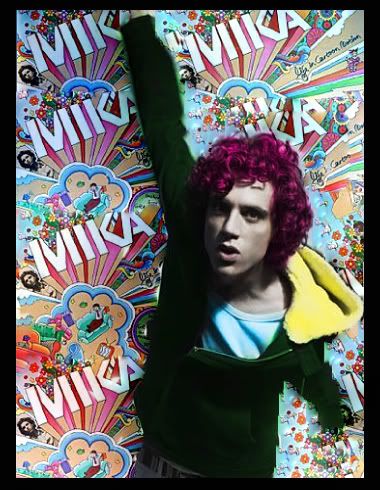 |
be one of the scavenger youths from
Doris Lessings Memoirs of a survivor.
I think pop culture is a watered down version of folk culture, and that pop culture, as we know it, has a degenerative, decadent characteristic to it, whereas folk culture is more uplifting.
Still, what pop culture does, besides give us the culture of our time and hopefully our locale, is some kind of collective psychological barometer as to where our culture is going.
I recently came across this very poppy pop song titled "We are golden" composed and sung by a young man called Mika. Apparently, he is quite a pop phenomenon. He studied music at the Royal College of Music in England before writing his own songs.
Since I equate pop songs with folk songs, I take them seriously. This particular song is big, orchestral, cosmic even. But it is really uncanny too, because of the lyrics.
Now, thanks to the web, I was able to find a line of Mika’s song in Joni Mitchell’s "Woodstock" with precisely those same lines – "we are golden."
Here is part of the lyrics from Mika’s song ("we are golden" is part of the refrain):
I was a boy at an open doorHere is part of Joni Mitchell’s "Woodstock" – again "we are golden" is part of the refrain.
Why you staring
Do you still think that you know?
Looking for treasure
In the things that you threw
Like a magpie
I live for glitter, not you
We are not what you think we are
We are golden, we are golden
(We are not what you think we are
We are golden, we are golden)
I came upon a child of GodI knew of Mitchell’s song, but had forgotten it.
He was walking along the road
And I asked him where are you going
And this he told me
I'm going on down to Yasgur's farm
I'm going to join in a rock 'n' roll band
I'm going to camp out on the land
I'm going to try an' get my soul free
We are stardust
We are golden
And we've got to get ourselves
Back to the garden
I think Mika’s song is about dystopia, the end of the world, the end of everything, whereas Mitchell’s is about leaving earth to return to paradise. Mika has given up on earth and heaven; Joni still dreams of heaven.
Mitchell’s song was written 1969; Mika’s in 2009. This is the progress our culture has made in the last forty years. Although the vestiges of this profound nihilism are to be found in Mitchell’s song, it has a ring of hope to it. In Mika’s there is an unabashed abandon. The song sounds optimistic, but it is just a wild frenzy of the moment. Let’s sing ourselves to our deaths, he seems to be saying.
What happened in these last forty years to bring forth a Mika? Why couldn’t Mitchell’s song have steered us (and her) towards another, better, path?
Mika’s characters, all those Golden Ones, remind me of course of Hitler’s golden youth. But Doris Lessing, in her 1974 dark novel Memoirs of a Survivor, writes about confident youth taking over a world that has caved in on itself. The grown-ups, the adults, who caused this destruction, are no longer in the picture. Instead, "Lord of the Flies" style, young teenagers are running the show, vandalizing and tormenting the adults as they scavenge through garbage bins for shiny things.
Lessing's prophecy is coming true, at least in Mika's songs.